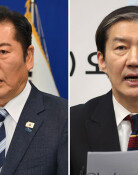[Editorial] Roh`s After-School Plan
[Editorial] Roh`s After-School Plan
Posted January. 28, 2006 04:08,
The current administrations education policy focusing on reducing competitiveness among top students is a mistake. Changing the College Scholastic Ability Test (CSAT) to a level-based system so that all students from the highest to the 24,000th are classified at the same level, or prohibiting universities from administering their own written exams despite existing differences in school academic levels are anachronisms that discourage Koreas best and brightest.
What is worse, the policy neither reduces private education expenses nor provides more education opportunities for low-income students. The college entrance system that will be implemented starting 2008 requires students to prepare in areas other than school grades and the CSAT, increasing their private education expense burden. The system will be unfavorable to low-income students as a result.
In a paper submitted to the Korea Labor Panels academic forum scheduled for February 2, the actual circumstances of bipolarization of the education are stated. Sungkyunkwan University professor Cha Jong-cheon has authored a study that shows the likelihood of children of high-income professionals becoming high-income professionals themselves is 3.62 times higher than children of unskilled laborers. Professor Yang Jeong-ho from the same university says that the difference in private education expenses between the top 20 percent in terms of income and the lowest 20 percent increased from 7.6 times in 2001 to 8.6 times in 2004. This shows that it is becoming harder and harder to climb the social class ladder with education alone.
In order to solve these problems, the quality of public education has to be enhanced, and schools should provide opportunities for low-income students to develop their talents and potential as much as possible. Experts agree that schools have to make more of an effort to teach students and prevent hereditary poverty through education.
The fact that President Roh Moo-hyun announced his strong determination to adopt after-school programs for low-income class children in his New Years address is very commendable. Until now, his administration has neglected low-income education. Through the proposed after-school programs, low-income students can receive supplementary lessons almost cost-free from outside instructors, and their academic ability is expected to improve as a result.
The Korean Teachers and Education Workers Union opposes Rohs plan, however, saying that it will stimulate private education inside schools.
Before opposing the plan, the Korean Teachers and Education Workers Union should look at how much it has done for low-income students itself. A union that speaks of democratized education and equal education while opposing a government after-school program for low-income students is deceiving the nation.



![[단독]이혜훈 “장남 다자녀로 연대 입학”…당시 그런 전형 없었다](https://dimg.donga.com/c/138/175/90/1/wps/NEWS/IMAGE/2026/01/23/133215083.1.jpg)
![하버드 의사가 실천하는 ‘뇌 노화 늦추는 6가지 습관’ [노화설계]](https://dimg.donga.com/c/138/175/90/1/wps/NEWS/IMAGE/2026/01/22/133210626.3.jpg)

![[단독]“5000만원씩 두 상자…윤영호 ‘王자 노리개 상자’ 권성동에 건네”](https://dimg.donga.com/c/138/175/90/1/wps/NEWS/IMAGE/2026/01/23/133215085.1.jpg)
